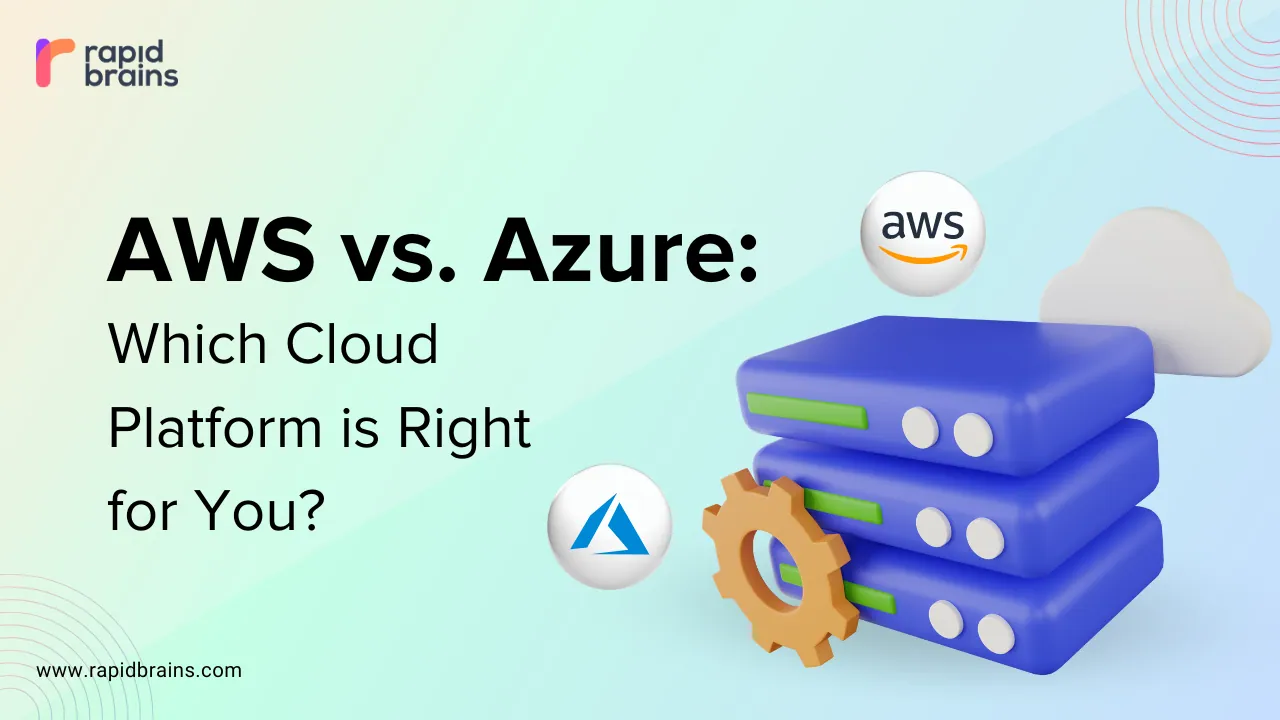
Introduction
When it comes to cloud computing, there are two major players: Amazon Web Services (AWS) and Microsoft Azure. Both platforms offer a wide range of services, making it difficult to decide which one is right for you. In this blog post, we will compare AWS and Azure on a number of factors, including features, uses, pricing, and more. We will also provide some guidance on how to choose the right cloud platform for your needs.
What is AWS?
AWS is a suite of cloud computing services that runs on the Amazon Web Services platform. AWS offers a broad set of global compute, storage, database, analytics, application, and deployment services that help organizations move faster, lower IT costs, and scale applications
Features of AWS
- Compute: AWS offers a variety of compute services, including Elastic Compute Cloud (EC2), Elastic Beanstalk, and Lambda.
- Storage: AWS offers a variety of storage services, including Simple Storage Service (S3), Relational Database Service (RDS), and DynamoDB.
- Database: AWS offers a variety of database services, including RDS, DynamoDB, and Redshift.
- Analytics: AWS offers a variety of analytics services, including Amazon Redshift, Amazon QuickSight, and Amazon Athena.
- Application: AWS offers a variety of application services, including Elastic Beanstalk, Lambda, and API Gateway.
- Deployment: AWS offers a variety of deployment services, including CodeDeploy, CodePipeline, and CodeBuild
Uses of AWS
AWS is used by a wide variety of organizations, including startups, enterprises, and government agencies. AWS is used for a variety of purposes, including:
- Hosting web applications
- Storing data
- Running big data analytics
- Developing and deploying applications
- Testing and deploying software
- Disaster recovery
What is Azure?
Azure is a cloud computing platform developed by Microsoft. Azure offers a wide range of services, including compute, storage, database, analytics, application, and networking services.
Features of Azure:
- Compute: Azure offers a variety of compute services, including Virtual Machines (VMs), App Service, and Functions.
- Storage: Azure offers a variety of storage services, including Blob Storage, Disk Storage, and Table Storage.
- Database: Azure offers a variety of database services, including SQL Database, MySQL Database, and PostgreSQL Database.
- Analytics: Azure offers a variety of analytics services, including Azure Data Lake, Azure Data Factory, and Azure Databricks.
- Application: Azure offers a variety of application services, including App Service, Logic Apps, and Service Bus.
- Networking: Azure offers a variety of networking services, including Azure Virtual Networks, Azure Load Balancing, and Azure Traffic Manager.
Uses of Azure
Azure is used by a wide variety of organizations, including startups, enterprises, and government agencies. Azure is used for a variety of purposes, including:
- Hosting web applications
- Storing data
- Running big data analytics
- Developing and deploying applications
- Testing and deploying software
- Disaster recovery
AWS vs. Azure: Comparing Cloud Computing Platforms
AWS and Azure are both leading cloud computing platforms, but they have different strengths and weaknesses.
Pros of AWS:
- Scalability: AWS offers virtually unlimited scalability, allowing businesses to quickly scale their infrastructure as needed.
- Wide Range of Services: AWS provides a comprehensive suite of cloud services, including computing power, storage, databases, AI, and more.
- Global Infrastructure: AWS has a vast network of data centers globally, ensuring reliable and low latency access to services from various regions.
- Flexibility and Cost Efficiency: AWS offers flexible pricing options, allowing businesses to pay only for the resources they use, reducing costs.
Cons of AWS:
- Complexity: The extensive range of AWS services can be overwhelming and complex, requiring a learning curve for users.
- Pricing Complexity: While AWS offers flexible pricing, understanding and optimizing costs can be challenging, especially for complex deployments.
- Support Dependency: Reliance on AWS support for technical issues may lead to delays in problem resolution.
- Vendor Lock-In: Migrating away from AWS to another cloud provider or on-premises infrastructure may be complex and time-consuming.
Pros of Azure:
- Strong Integration with Microsoft Ecosystem: Azure seamlessly integrates with other Microsoft tools and services, making it convenient for businesses already using Microsoft products.
- Global Footprint: Azure has a widespread network of data centers worldwide, enabling businesses to deploy their services closer to their target audience.
- Hybrid Capabilities: Azure provides robust hybrid cloud capabilities, allowing businesses to integrate on-premises infrastructure with the cloud seamlessly.
- AI and Machine Learning Services: Azure offers a wide range of AI and machine learning tools and services, empowering businesses to build intelligent applications.
Cons of Azure:
- Learning Curve: Azure’s vast array of services and features can have a steep learning curve, requiring time and effort to master.
- Pricing Complexity: Understanding Azure’s pricing structure and optimizing costs can be challenging, especially for complex deployments.
- Limited Marketplace: Azure’s marketplace might have fewer offerings compared to other cloud providers, limiting the available solutions for specific needs.
- Less Familiarity: Azure might have a smaller user base compared to AWS, resulting in potentially fewer community resources and support options.
Features and Services:
AWS and Azure provide an extensive array of services, including computing power, storage options, databases, networking, machine learning, and more. AWS, with its head start in the market, offers a broader range of services and features, catering to diverse business requirements. Azure, on the other hand, leverages its integration with Microsoft products, making it an attractive choice for organizations already using Microsoft technologies. When comparing features, it’s essential to evaluate which services align better with your project goals.
Scalability and Performance
Both AWS and Azure boast impressive scalability and performance capabilities. AWS has a wellestablished global infrastructure, consisting of numerous data centers spread across regions worldwide, enabling high availability and low latency. Azure, with its vast network of data centers, also provides excellent scalability and performance. The choice between the two may depend on the specific geographical locations you require, as well as your performance expectations.
Pricing and Cost Management
Pricing models for AWS and Azure differ, and understanding their pricing structures is crucial for optimizing costs. AWS offers a pay-as-you-go model, allowing users to pay only for the resources they use. Azure follows a similar model, but it also provides reserved instances for long-term commitments, which can lead to cost savings for predictable workloads. It’s important to analyze your usage patterns and projected costs to determine which platform offers better pricing options for your business.
Security and Compliance
Both AWS and Azure have robust security measures in place to protect data and ensure compliance with industry regulations. AWS has a comprehensive suite of security services and adheres to numerous compliance standards, making it suitable for organizations with strict security requirements. Azure provides similar security features and compliance certifications, leveraging Microsoft’s expertise in enterprise-grade security. Assessing your specific security needs and compliance obligations will help you make an informed decision.
Integration and Vendor Lock-In
Integration with existing systems and applications is a crucial aspect when selecting a cloud computing platform. AWS has a vast ecosystem of third-party integrations and enjoys widespread compatibility with various technologies. Azure, as a Microsoft product, offers seamless integration with other Microsoft tools and services, providing a unified experience for users. Understanding your integration requirements and the potential for vendor lock-in is essential in making the right choice.
Support and Documentation
Both AWS and Azure provide comprehensive documentation, tutorials, and support options to assist users in getting started and resolving any issues. AWS has a vast community of users, which means you can find extensive resources and online forums to seek help. Azure, with its ties to the Microsoft ecosystem, benefits from Microsoft’s extensive support network. Assessing the available support options and the level of assistance you may require is crucial, particularly for organizations with complex deployments.
Conclusion:
Choosing between AWS and Azure ultimately depends on your specific requirements, preferences, and existing technology stack. AWS, with its extensive service offerings and market dominance, suits a wide range of businesses. Azure, on the other hand, leverages its Microsoft integration and appeals to organizations already invested in Microsoft technologies. Carefully evaluating factors such as features, scalability, pricing, security, integration, and support will enable you to make an informed decision and leverage the full potential of your chosen cloud computing platform.




